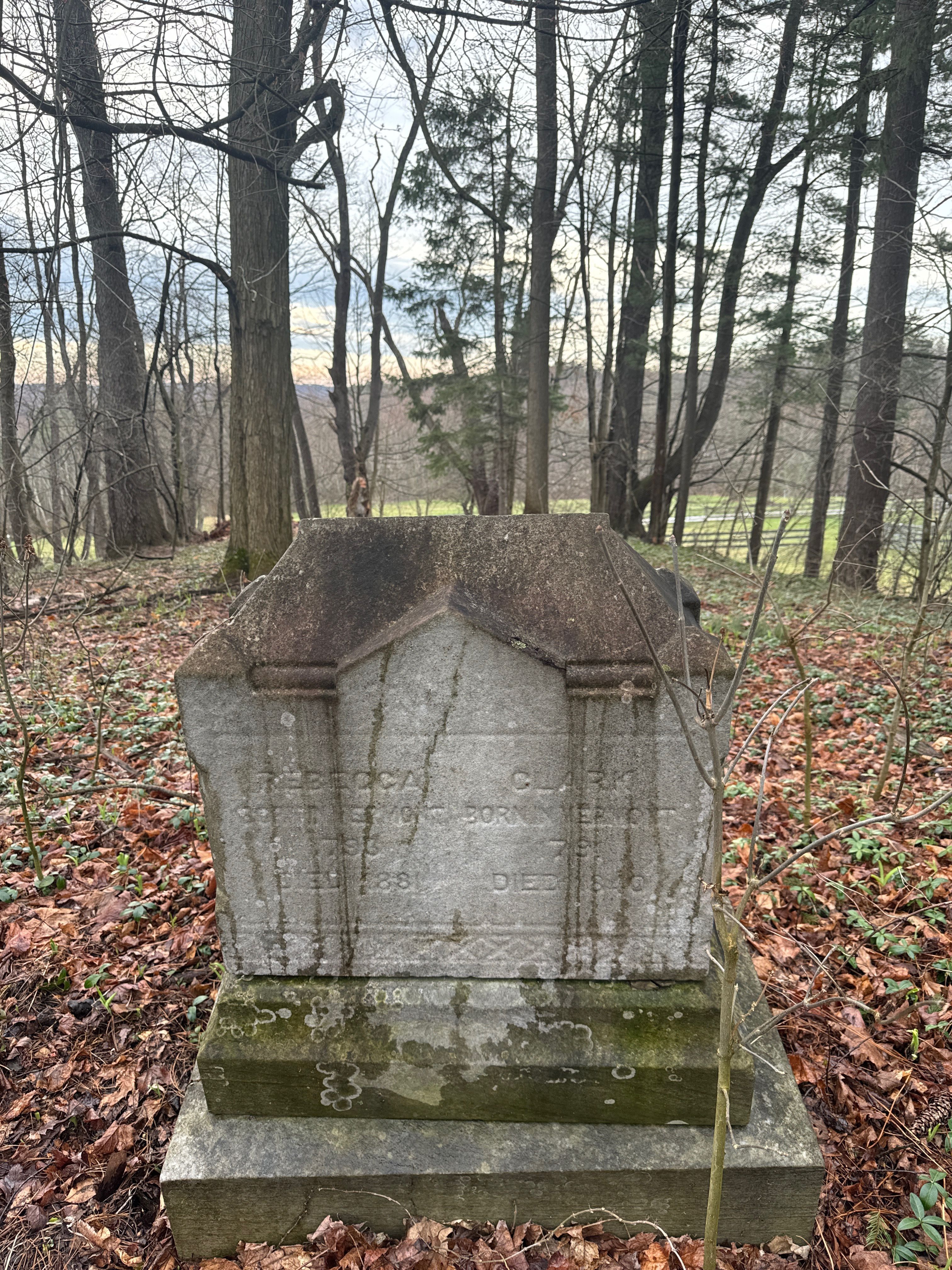Husband of Rebecca (Matteson) Robinson.
In 1820, Clark Robinson, his wife, Rebecca, and three sons (Clark Jr., Edwin, and David) moved from Shaftsbury, Vermont to Middlefield, Ohio. In 1825, Clark paid $3 an acre to Thomas and Frederick Kinsman for 136 acres of property located on the east line of what is presently Russell Township. The deed was not recorded until four years later on December 11, 1829. The fourth Robinson child, a daughter, Phoebe, was born after the family moved to Russell.
Clark Robinson is reported to have built the body of a log house on this land on November 7, 1825 and moved his family into the incomplete structure the following day. Snow and rain storms during the night necessitated that Clark put up a make-shift roof of loose boards to keep his family dry until he could finish the structure.
Clark Robinson was an ambitious, out-spoken man, whose opinion and respect was highly esteemed. When Russell Township was formed in 1827, Clark and Gideon Russell were elected the township's first Trustees. Clark was also elected as Russell Township's first Justice of Peace on August 25,1827.
In 1830, Clark Robinson built a frame farmhouse and operated a office and general store on the premises. Robinson built the first frame buildings in Russell, including a cheese factory, a barn, a hotel and eventually a store in the center of Russell Township to replace the one in his home. He was instrumental in laying out and clearing the land-for Kinsman Road, Road, and Hemlock Point Road-major highways that exist today. As first storekeeper in the area, Clark bartered and traded with people the area for goods. He is said to have been one of the first men in the area to produce black salt, a by-product of burnt leg ash that was leached and boiled down to make lye, that was traded in Pittsburgh for nails, glass and calico. He was also one of the first men in the area to raise cattle and drive them East to sell for profit.
The Robinson Family was of unusual energy. They were liberal in their views and not noted for strictness in religion. With their diversified interests, it is easy to understand why the Farmhouse became a gathering place for young people, as well as a place to conduct community business. At the time of his death at the Homestead in 1840, Clark Robinson owned 685 acres of land in Russell Township.
Husband of Rebecca (Matteson) Robinson.
In 1820, Clark Robinson, his wife, Rebecca, and three sons (Clark Jr., Edwin, and David) moved from Shaftsbury, Vermont to Middlefield, Ohio. In 1825, Clark paid $3 an acre to Thomas and Frederick Kinsman for 136 acres of property located on the east line of what is presently Russell Township. The deed was not recorded until four years later on December 11, 1829. The fourth Robinson child, a daughter, Phoebe, was born after the family moved to Russell.
Clark Robinson is reported to have built the body of a log house on this land on November 7, 1825 and moved his family into the incomplete structure the following day. Snow and rain storms during the night necessitated that Clark put up a make-shift roof of loose boards to keep his family dry until he could finish the structure.
Clark Robinson was an ambitious, out-spoken man, whose opinion and respect was highly esteemed. When Russell Township was formed in 1827, Clark and Gideon Russell were elected the township's first Trustees. Clark was also elected as Russell Township's first Justice of Peace on August 25,1827.
In 1830, Clark Robinson built a frame farmhouse and operated a office and general store on the premises. Robinson built the first frame buildings in Russell, including a cheese factory, a barn, a hotel and eventually a store in the center of Russell Township to replace the one in his home. He was instrumental in laying out and clearing the land-for Kinsman Road, Road, and Hemlock Point Road-major highways that exist today. As first storekeeper in the area, Clark bartered and traded with people the area for goods. He is said to have been one of the first men in the area to produce black salt, a by-product of burnt leg ash that was leached and boiled down to make lye, that was traded in Pittsburgh for nails, glass and calico. He was also one of the first men in the area to raise cattle and drive them East to sell for profit.
The Robinson Family was of unusual energy. They were liberal in their views and not noted for strictness in religion. With their diversified interests, it is easy to understand why the Farmhouse became a gathering place for young people, as well as a place to conduct community business. At the time of his death at the Homestead in 1840, Clark Robinson owned 685 acres of land in Russell Township.
Family Members
Advertisement
Explore more
Sponsored by Ancestry
Advertisement



















